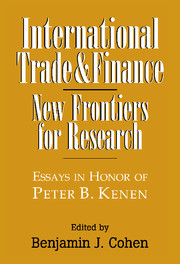Book contents
- Frontmatter
- Contents
- List of contributors
- Introduction
- 1 The practical theorist: Peter Kenen's contribution to international economics
- I International trade theory
- II International monetary theory
- III Applied policy analysis
- 9 Labor market adjustment and trade: Their interaction in the Triad
- 10 Do the G-3 countries coordinate monetary policy?
- 11 Fundamental determinants of Mexico's exchange-rate crisis of 1994
- 12 Devaluation cycles and adjustment costs
- 13 Payments problems in the Commonwealth of Independent States
- Index
10 - Do the G-3 countries coordinate monetary policy?
Published online by Cambridge University Press: 11 September 2009
- Frontmatter
- Contents
- List of contributors
- Introduction
- 1 The practical theorist: Peter Kenen's contribution to international economics
- I International trade theory
- II International monetary theory
- III Applied policy analysis
- 9 Labor market adjustment and trade: Their interaction in the Triad
- 10 Do the G-3 countries coordinate monetary policy?
- 11 Fundamental determinants of Mexico's exchange-rate crisis of 1994
- 12 Devaluation cycles and adjustment costs
- 13 Payments problems in the Commonwealth of Independent States
- Index
Summary
Introduction
Government officials from the United States, Germany, and Japan meet periodically to discuss shared economic problems and, on occasion, to coordinate economic policy. These policy agreements are often made public as communiqués. This essay examines public agreements to coordinate monetary policy in the period since the mid-1970s.
Economic theory suggests that countries often benefit from international policy coordination. For example, macroeconomic spillovers can create situations in which governments have incentives to coordinate monetary policies. However, the empirical studies of the gains from policy coordination have generally found small, though nonzero, benefits.
The subject of macroeconomic policy coordination has been a longstanding interest of Peter B. Kenen's. Indeed Kenen's Ph.D. dissertation (Kenen, 1960) examines British monetary policy from 1951–7, a period during which Britain coordinated its policies with the United States within the framework of the Bretton Woods System. In his book Exchange Rates and Policy Coordination (1989), Kenen suggests that the conventional models used by economists to study policy coordination may miss the point. Coordination is typically defined narrowly as involving clearly defined, noncontingent policy changes that countries would not have put in place in the absence of an agreement. Under this definition there have been few, if any, genuine policy coordination agreements between countries. Most policymakers define coordination much more broadly to include agreements to consult with other countries before making major policy changes, and agreements to work for common goals or to combat common dangers.
- Type
- Chapter
- Information
- International Trade and FinanceNew Frontiers for Research, pp. 280 - 315Publisher: Cambridge University PressPrint publication year: 1997
- 2
- Cited by



